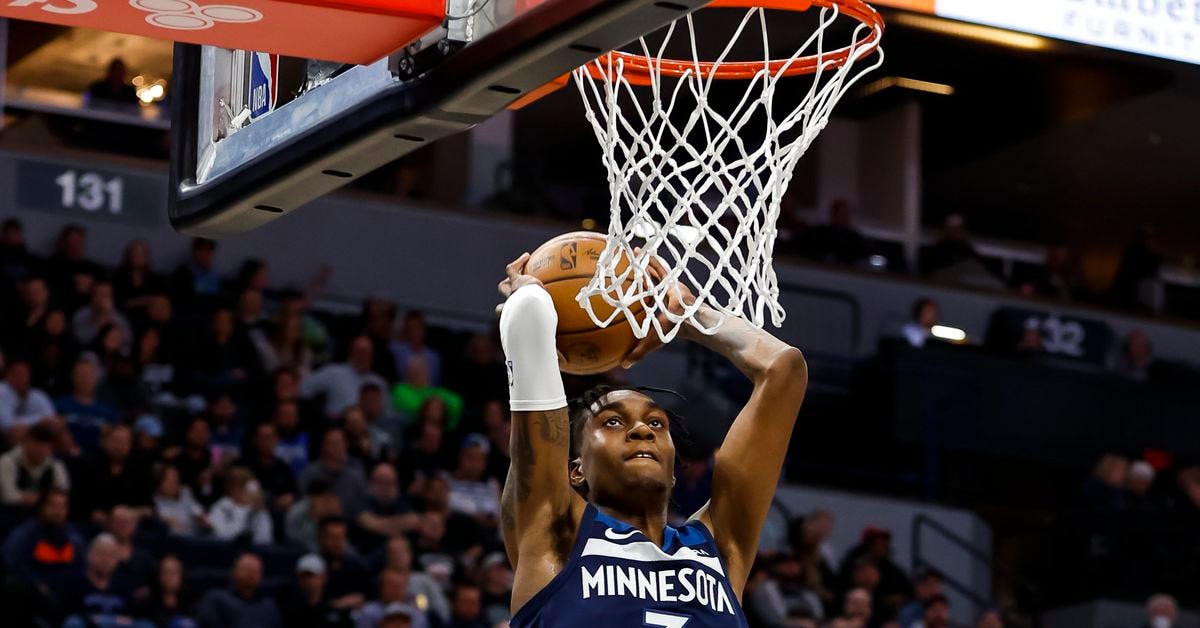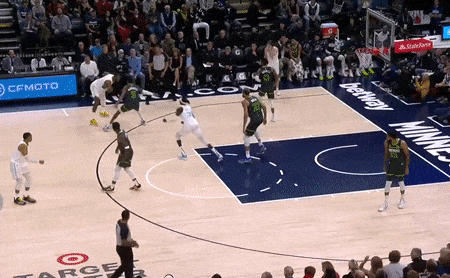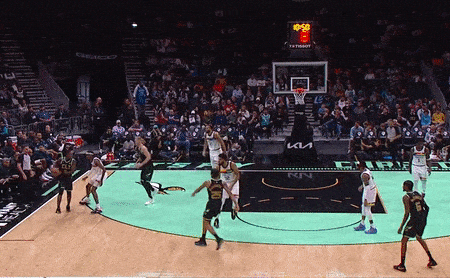Deep Dive: Jaden McDaniels Is A True Defensive Unicorn
Minnesota's third-year forward has best defender in the league potential, and he is starting to wield it consistently.
Jaden McDaniels played 24 minutes and 19 seconds in Minnesota’s loss to Charlotte on Friday night. He has those nights. The nights where foul trouble takes a stranglehold on his game and he isn’t able to shake free from it. On those nights, the Minnesota Timberwolves struggle as a whole. They lose their edge and their bite. They lose their unicorn.
The Hornets misfire was one of five games where the 22-year-old forward played under 25 minutes, the Timberwolves have lost all five of them. When he stays away from the referee’s ire and surpasses that threshold, Minnesota has a 10-4 win-loss record.
Those numbers could be a coincidence. In a small sample size of just 19 games, things can get funky. But when you see what McDaniels has done so far this season, the way he has improved, and the fires he puts out on a nightly basis, it truly makes sense. The former Washington Husky is the glue that holds much of what the Wolves do together.
Without even diving into his offensive improvements which are both vast and deserving of another fat deep dive themselves, McDaniels has become a monstrous defender who would be comfortably on an All-Defense team if the season ended today.
If his team as a whole could climb out of the inconsistent muck they find themselves trudging through, he might even build himself a case for Defensive Player of the Year.
That feels excessive, it feels unfathomable, it feels downright over-the-top. But there isn’t anybody like him. There isn’t anybody who makes his hodgepodge of skills and physical freakishness blend so perfectly.
Defensively, McDaniels is a unicorn. Not the played-out version of the word that circulated the league incessantly for a few years there, he is the true meaning. A genuine one-off. There are players who do some of the things he can do. There are others who might be able to do the things he can do in the future. There is no player in the league’s deep pool of players that can recreate what Minnesota’s wispy wing — when foul trouble isn’t an issue — does on a nightly basis.
That statement reeks of bias. He isn’t a star-level player. He isn’t even someone who has cemented himself as a household name at a national level. But sifting through the film and the statistics paints a masterpiece. A canvas that draws the eye to so many splashes, so many shades and so many sharp lines. Perhaps, even on a team where his impact is so inescapable, the beauty of that canvas becomes blurred when you stare at it night in and night out. Make no mistake, that beauty is still there.
His primary role is the linchpin of Finch’s perimeter defense. But that statement is a gross understatement of the ground he covers. Like calling a lion’s den the beast’s home. Sure, McDaniels eats and sleeps as a perimeter stopper, but he roams the savanna and hunts prey in so many ways that it’s hard to stuff him in the box of just a point-of-attack defender.
And, because of the multidimensional mayhem he causes, Minnesota’s defensive effectiveness seems to wither away when he isn’t on the floor. In the five games that he didn’t cross that aforementioned 25-minute mark, the Timberwolves as a whole allowed their opponents to score 112.9 points per 100 possessions. In the 14 games where he did avoid serious foul trouble and play close to his full allotment of minutes, they allowed 108.8 points per 100 possessions.
It’s not always a perfect way to weave statistics into a conversation, but 108.8 points allowed per 100 possessions would be the second-best mark in the league behind the stringent Milwaukee Bucks, according to Cleaning The Glass. A 112.9 mark would sit 19th leaguewide. Those five games are somewhat of a drop in the bucket compared to the 14 where he stayed away from foul trouble — Minnesota is fourth overall in points allowed per 100 possessions at 109.9 — but a clean sweep of losses from those five games says something about how important his minutes really are.
Without him out there chasing and hounding, all of his teammates are forced to take a step up in direct competition and have thus far struggled to handle those responsibilities. However, with McDaniels out there at the point-of-attack, the entire defense seems to magnetize and coalesce. It means Anthony Edwards can face less heat guarding secondary ball-handlers, D’Angelo Russell can be hidden on shooters, and Rudy Gobert has a gangly pit bull in front of him making rim-protection more of a shared responsibility rather than a cold and lonely island.
Even with his versatility, it’s still worth starting with his headline act. He is a ball-handler’s nightmare. There are already dozens of examples of him just doing special things with that area of his game, but this one stands out. The ability to make screens seem hilariously surmountable. The physical capabilities to deal with changes of pace and brute strength that far exceed what McDaniels should be able to match with his threadbare physique. The snarling attitude to weave that tapestry together.
McDaniels’ defensive effective plus-minus (EPM) is currently at +2.0, ranking in the 96th percentile among all players. He tangos terrifically with that by covering 1.4 miles of distance on defense per 75 possessions (97th percentile) and contesting 5.1 3-pointers per 75 possessions (93rd percentile). With the ability to get through screens, the willingness to chase and hassle every single possession, and the never-ending arms to contest looks, he becomes a matchup nightmare for big wings and shifty guards alike.
But he’s also an agent of chaos as a perimeter defender. The missed shots and the coerced passes are the smaller things that escape the box score, but he thrives on the scoresheet with his ability to turn opponents over.
Keep reading with a 7-day free trial
Subscribe to Howls and Growls to keep reading this post and get 7 days of free access to the full post archives.






